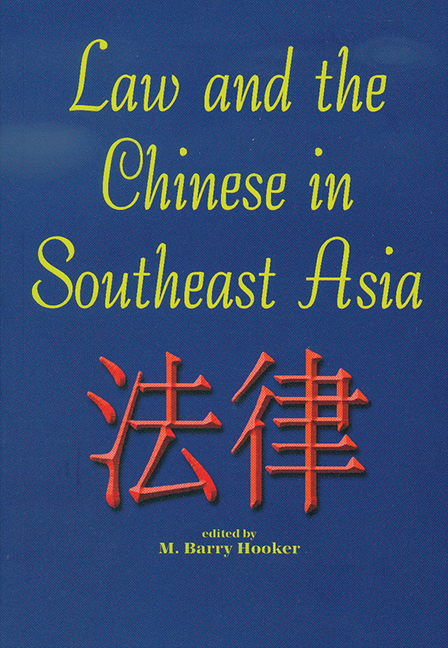Book contents
- Frontmatter
- Contents
- Preface
- The Contributors
- 1 Law and the Chinese Outside China: A Preliminary Survey of the Issues and the Literature
- 2 The Legal Position of the Ethnic Chinese in Indochina under French Rule
- 3 Law and Memory, De Jure to De Facto: Confucianization and its Implications for Family and Property in Vietnam
- 4 English Law and the Invention of Chinese Personal Law in Singapore and Malaysia
- 5 The Indonesian Chinese: “Foreign Orientals”, Netherlands Subjects, and Indonesian Citizens
- 6 Chinese Family Firms in Indonesia and the Question of “Confucian Corporatism”
- 7 China's Citizenship Law and the Chinese in Southeast Asia
- Index
2 - The Legal Position of the Ethnic Chinese in Indochina under French Rule
Published online by Cambridge University Press: 21 October 2015
- Frontmatter
- Contents
- Preface
- The Contributors
- 1 Law and the Chinese Outside China: A Preliminary Survey of the Issues and the Literature
- 2 The Legal Position of the Ethnic Chinese in Indochina under French Rule
- 3 Law and Memory, De Jure to De Facto: Confucianization and its Implications for Family and Property in Vietnam
- 4 English Law and the Invention of Chinese Personal Law in Singapore and Malaysia
- 5 The Indonesian Chinese: “Foreign Orientals”, Netherlands Subjects, and Indonesian Citizens
- 6 Chinese Family Firms in Indonesia and the Question of “Confucian Corporatism”
- 7 China's Citizenship Law and the Chinese in Southeast Asia
- Index
Summary
As in many parts of Southeast Asia, the Chinese community long played a prominent role in Indochinese society. Much has been written about the interaction between the Chinese and the local populace, their institutions and their culture, and the influence of Chinese culture on the development of Indochina has been well noted. However, how did they fare at the hands of the law during the colonial period? The changing attitudes of the French towards colonialization provided the framework for how they ruled the various parts of Indochina. Ruling Indochina became a balancing act between the French interest in developing it as a “back door” to China, the economic interests and power of the Chinese community, and the latent resentment of the local population towards the Chinese stranglehold over the economy.
The threshold question in examining how the ethnic Chinese population fared under French colonial rule is a question of identity: what was “Chinese” in the eyes of the law? Given the tradition of intermarriage with the local population, it was not always easy to delineate the Chinese as a specific legal subject. From the French point of view, the importance of controlling the Chinese lay mainly in their economic strength. As a consequence, it was largely in the public areas of law that ethnicity-specific regulation aimed at the Chinese was prolific. The French also saw a need for regulating the Chinese in private law matters, such as property and contract, since these were integral to the economic role that they played.
This chapter gives an overview of the legal régime that governed the ethnic Chinese population in Indochina under French rule: how did the French colonialists use the law to control the Chinese? In what way did the Chinese legal position affect the relations between the Chinese and the local population? Lastly, what was the role of China as the “motherland” to the Chinese community, and how did the relations between France and China affect the Chinese community in Indochina?
THE POSITION OF THE CHINESE BEFORE FRENCH RULE
The relationship between China and what is now known as Vietnam can be described through time as both symbiotic and adversarial: while there was a desire to cultivate a concept of “our kingdom” and numerous revolts against Chinese hegemony, at various stages throughout history, Indochina was also a tributary to China.
- Type
- Chapter
- Information
- Law and the Chinese in Southeast Asia , pp. 32 - 64Publisher: ISEAS–Yusof Ishak InstitutePrint publication year: 2002

